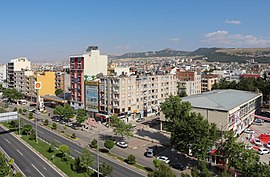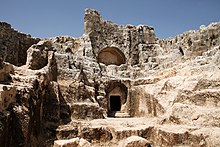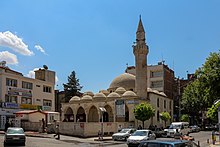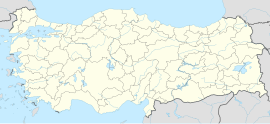Adıyaman
Adıyaman | |
|---|---|
 Atatürk Boulevard in Adıyaman | |
| Coordinates: 37°45′50″N 38°16′40″E / 37.76389°N 38.27778°E | |
| Country | Turkey |
| Province | Adıyaman |
| District | Adıyaman |
| Government | |
| • Mayor | Abdurrahman Tutdere (CHP) |
| Population (2021)[1] | 267,131 |
| Time zone | UTC+3 (TRT) |
| Website | www |
Adıyaman (Kurdish: Semsûr[2][3][4]) is a city in southeastern Turkey. It is the administrative centre of Adıyaman Province and Adıyaman District.[5] Its population is 267,131 (2021).[1] The inhabitants of the city are mostly Kurdish.[6][7]
The city was one of the worst affected by the February 2023 Turkey-Syria earthquakes.[8] Many buildings were destroyed and many lives lost in part because bad weather and damage to the transport infrastructure delayed the arrival of rescue teams.[9]
Etymology
An unverified theory is that the former name of the city, Hisn-Mansur derives from the name of the Umayyad Emir Mansur ibn Jawana who was killed by the Abbasid Caliph Al-Mansur in this region in 758.[10][11] Because of the difficulty among the locals in pronouncing Hisn-Mansur, the corruption Semsur emerged.[12]
Various unverifiable theories exist for the name.[12]



History
The first settlement on the site of the city was the ancient town of Perrhe, part of the kingdom of Commagene before it became part of the Roman and later Byzantine Empire.
It was then captured by the Arabs and became known as Hisn Mansur. It became a contested border town between the Abbasid caliphate and the Byzantines and was therefore well protected; a wall with three gates and a ditch guarded the town while in its middle stood a fortress with double walls.[13]
In the early eleventh century, the town formed part of the Byzantine defences in the Euphrates region together with Edessa, Gargar, Samosata and Chasanara.[14] In 1066/1067, the region around the town was ravaged by a Turkish emir called Gümüshtekīn who took booty and captives.[15]
By the end of the eleventh century, the Byzantines had lost control of the town and it was now in possession of the Armenian local ruler Kogh Vasil.[16]
Places of interest

There is some passing tourist trade, the main tourist attraction being Mount Nemrut.
- The caves of Pirin (ancient city of Perre) are 5 km (3 mi). from Adıyaman. These have been used as a burial ground for thousands of years. The sights include the ruins of the city and burial caves carved into the rock.
- The only active church in Adıyaman Province is located here, where it is the center of the Syriac Orthodox patriarchal vicarate of Adıyaman.[17][18] It was renovated and reopened in 2012.[19]
Climate
Adıyaman has a hot summer Mediterranean climate (Csa) under both the Köppen and Trewartha classifications, with some continental characteristics. Summers are very hot and very dry. Temperatures often reach 40 °C (104 °F) at the height of summer. The highest recorded temperature was 45.3 °C (113.5 °F) on 30 July 2000. Winters in Adıyaman are cool to cold with heavy precipitation. Due to its inland location and relatively high altitude, frost and snow are common. The lowest recorded temperature was −14.4 °C (6.1 °F) on 24 January 1972.
| Climate data for Adıyaman (1991–2020, extremes 1963–2024) | |||||||||||||
|---|---|---|---|---|---|---|---|---|---|---|---|---|---|
| Month | Jan | Feb | Mar | Apr | May | Jun | Jul | Aug | Sep | Oct | Nov | Dec | Year |
| Record high °C (°F) | 19.9 (67.8) |
23.8 (74.8) |
28.3 (82.9) |
34.5 (94.1) |
39.0 (102.2) |
43.0 (109.4) |
45.3 (113.5) |
45.2 (113.4) |
42.2 (108.0) |
36.1 (97.0) |
29.4 (84.9) |
26.5 (79.7) |
45.3 (113.5) |
| Mean daily maximum °C (°F) | 9.2 (48.6) |
10.9 (51.6) |
15.7 (60.3) |
21.1 (70.0) |
27.4 (81.3) |
34.1 (93.4) |
38.7 (101.7) |
38.6 (101.5) |
33.6 (92.5) |
26.3 (79.3) |
17.4 (63.3) |
11.1 (52.0) |
23.7 (74.7) |
| Daily mean °C (°F) | 5.0 (41.0) |
6.2 (43.2) |
10.4 (50.7) |
15.3 (59.5) |
20.9 (69.6) |
27.1 (80.8) |
31.5 (88.7) |
31.2 (88.2) |
26.2 (79.2) |
19.7 (67.5) |
11.9 (53.4) |
6.8 (44.2) |
17.7 (63.9) |
| Mean daily minimum °C (°F) | 1.8 (35.2) |
2.5 (36.5) |
5.9 (42.6) |
10.0 (50.0) |
14.7 (58.5) |
20.1 (68.2) |
24.1 (75.4) |
23.9 (75.0) |
19.4 (66.9) |
14.2 (57.6) |
7.6 (45.7) |
3.6 (38.5) |
12.3 (54.1) |
| Record low °C (°F) | −14.4 (6.1) |
−10.0 (14.0) |
−7.0 (19.4) |
−2.0 (28.4) |
3.4 (38.1) |
10.6 (51.1) |
15.0 (59.0) |
15.8 (60.4) |
9.6 (49.3) |
2.2 (36.0) |
−3.5 (25.7) |
−8.4 (16.9) |
−14.4 (6.1) |
| Average precipitation mm (inches) | 140.5 (5.53) |
107.1 (4.22) |
87.3 (3.44) |
61.7 (2.43) |
45.2 (1.78) |
9.4 (0.37) |
1.9 (0.07) |
2.5 (0.10) |
9.2 (0.36) |
48.6 (1.91) |
74.1 (2.92) |
142.0 (5.59) |
729.5 (28.72) |
| Average precipitation days | 12.37 | 11.77 | 11.47 | 11.3 | 8.4 | 3 | 0.8 | 0.67 | 1.63 | 6.8 | 8.3 | 11.7 | 88.2 |
| Average snowy days | 2.7 | 0.6 | 0.3 | 0 | 0 | 0 | 0 | 0 | 0 | 0 | 0 | 0.8 | 4.4 |
| Average relative humidity (%) | 66.4 | 64.4 | 57.9 | 55.1 | 47.6 | 33 | 27.5 | 29.4 | 33.3 | 45.5 | 59 | 67.4 | 48.9 |
| Mean monthly sunshine hours | 108.5 | 124.3 | 170.5 | 213.0 | 269.7 | 324.0 | 347.2 | 322.4 | 264.0 | 204.6 | 150.0 | 102.3 | 2,600.5 |
| Mean daily sunshine hours | 3.5 | 4.4 | 5.5 | 7.1 | 8.7 | 10.8 | 11.2 | 10.4 | 8.8 | 6.6 | 5.0 | 3.3 | 7.1 |
| Source 1: Turkish State Meteorological Service[20] | |||||||||||||
| Source 2: NCEI(humidity),[21] Meteomanz(snow days 2008-2023)[22] | |||||||||||||
Neighbourhoods
The city has 33 quarters, including Esentepe.[23]
See also
References
- ^ a b "Address-based population registration system (ADNKS) results dated 31 December 2021" (XLS) (in Turkish). TÜİK. Retrieved 12 January 2023.
- ^ Ofra Bengio (2014). Kurdish Awakening: Nation Building in a Fragmented Homeland. p. 136.
- ^ Avcıkıran, Adem (2009). Kürtçe Anamnez Anamneza bi Kurmancî (in Turkish and Kurdish). p. 56.
- ^ Çiftçi, Tekin (2019). "Adıyaman ve Çevresinde Halk İnançları ve Halk Hekimliği (Baweriyên Gelêrî û Dermanê Kurmancî Li Herêma Semsûrê)". Dicle University Institute of Social Sciences (in Turkish). Dicle University: 42.
- ^ İl Belediyesi, Turkey Civil Administration Departments Inventory. Retrieved 15 January 2023.
- ^ Polat, Müslüm; Türkan, Yavuz (2012). "Osmanlıdan Günümüze Kürtlerde Ekonomik Hayat". Kimlik, Kültür ve Değişim Sürecinde Osmanlı'dan Günümüze Kürtler Uluslararası Sempozyum. Bingöl University: 307.
- ^ Balcı, Ali; Efe, Ibrahim (2014). "The 2014 elections: Reflections on the Kurdish question" (PDF). Sakarya University. SETA. p. 14. Archived (PDF) from the original on 2021-04-19. Retrieved 19 April 2021.
- ^ "Kahramanmaraş'ta 7,4 büyüklüğünde deprem, teyit edilmemiş yıkım haberleri var" [7.4 magnitude earthquake in Kahramanmaraş, there are unconfirmed destruction news]. BBC News (in Turkish). 6 February 2023. Archived from the original on 6 February 2023. Retrieved 6 February 2023.
- ^ AA, Daily Sabah with (2023-02-13). "Restoration of roads underway in quake-hit Türkiye's Adıyaman". Daily Sabah. Retrieved 2023-02-14.
- ^ Sinclair, Thomas T. (July 2008). "Adıyaman". Encyclopedia of Islam, Third Edition.
- ^ Taeschner, Franz (24 April 2012). "Adiyaman". Encyclopedia of Islam, Second Edition.
- ^ a b Han, Suna (2001). "Adıyaman Tarihi ve Kültürü" (PDF). Near East University Science Literature Faculty. Nicosia: Near East University: 1. Archived from the original (PDF) on 2021-04-20. Retrieved 2021-04-20.
- ^ Strange 2010, p. 123.
- ^ Beihammer 2017, p. 115.
- ^ Beihammer 2017, p. 116.
- ^ Beihammer 2017, p. 294.
- ^ "Mor Malki Ürek". soc-wus.org. Archived from the original on 24 April 2018. Retrieved 24 April 2018.
- ^ location of building-37.757316, 38.273478
- ^ "Mor Petrus-Mor Paulus Kilise'si restore edilerek ibadete açıldı! - 10-12-2012". emlakkulisi.com. Archived from the original on 4 March 2016. Retrieved 24 April 2018.
- ^ "Resmi İstatistikler: İllerimize Ait Mevism Normalleri (1991–2020)" (in Turkish). Turkish State Meteorological Service. Retrieved 26 June 2021.
- ^ "World Meteorological Organization Climate Normals for 1991-2020: Adiyaman" (CSV). ncei.noaa.gov. National Oceanic and Atmosoheric Administration. Retrieved 23 June 2024.
- ^ "Adiyaman - Weather data by months". meteomanz. Retrieved 12 July 2024.
- ^ Mahalle, Turkey Civil Administration Departments Inventory. Retrieved 15 January 2023.
Sources
- Beihammer, Alexander Daniel (2017). Byzantium and the Emergence of Muslim Turkish Anatolia, ca. 1040-1130. Routledge. ISBN 978-1-138-22959-4.
- Strange, Guy Le (1 January 2010). The Lands of the Eastern Caliphate: Mesopotamia, Persia, and Central Asia from the Moslem Conquest to the Time of Timur. Cosimo, Inc. ISBN 978-1-61640-512-0. Retrieved 6 March 2024.


